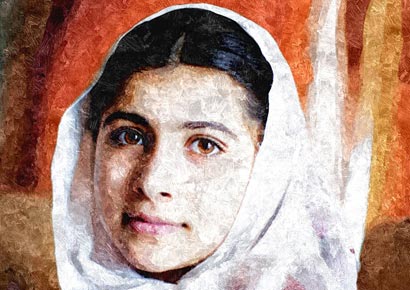M WAQAR..... "A man's ethical behavior should be based effectually on sympathy, education, and social ties; no religious basis is necessary.Man would indeed be in a poor way if he had to be restrained by fear of punishment and hope of reward after death." --Albert Einstein !!! NEWS,ARTICLES,EDITORIALS,MUSIC... Ze chi pe mayeen yum da agha pukhtunistan de.....(Liberal,Progressive,Secular World.)''Secularism is not against religion; it is the message of humanity.'' تل ده وی پثتونستآن
Monday, October 29, 2012
Malala’s Revolution !!!
The men who attempted to kill 14-year-old Malala Yousafzai on October 9 knew what she represented. Her active involvement since the age of eleven in campaigning for the rights of girls in her region to be educated was well known.Malala’s efforts, while applauded by the West and some segments of Pakistani society, were deeply resented by the obscurantist forces that go by the name of the Taliban, which in Pakistan calls itself Tehrik-e-Taliban Pakistan. Their choice of name is an ironic one, for Taliban, an Arabic word, means those seeking to be educated, whereas the Taliban’s principal aim is to keep Muslim societies backward so that they can be persuaded to adopt a seventh-century version of Islam.
Education, particularly of women, stands in the way of achieving this goal. But the attack on Malala will, most likely, have an effect that is opposite to that intended by those who carried it out.Several religious leaders joined the chorus of condemnation that followed the attack on Malala. In a sign of unity, a council of Sunni Muslim scholars in the eastern city of Lahore issued a fatwa, signed by 50 clerics, saying that the justifications cited by the girl’s attackers were “deviant” and had no basis in Islamic law.
The Taliban seem to have been taken aback by the public and media reaction to the attack. Dawn, Pakistan’s largest-circulation English-language newspaper, reported that Hakimullah Mehsud, the Pakistani Taliban’s leader, had ordered his foot soldiers to target media organisations in Karachi, Lahore, Rawalpindi, and Islamabad in response. Several TV channels had been extremely critical of the Taliban’s assaults on Pakistani society. The extremists wanted to silence the majority that was waking up to the existential threat that radical Islam poses to their country.
There is a widespread belief that Pakistani women are doing poorly when it comes to obtaining education. That impression is correct to some extent. The overall literacy rate for women is undoubtedly low — much lower than that for men. But male education and literacy in Pakistan is not very high, either. Although Pakistan is a signatory to the United Nations Millennium
Development Goals, which include attainment of universal literacy for both boys and girls by 2015, the country is far from achieving the target, with literacy rates of 70% for boys and only 45% for girls in 2010.
That said, over the 17-year period from 1993 to 2010, the number of girls enrolled in primary education increased from 3.7 million to 8.3 million. This implies a rate of growth of 6.7% a year, about 2.5 times the rate of increase in the number of girls entering the primary-school age cohort. But, even with this growth rate, girls still accounted for just 44.3% of the total number of enrolled students in 2010.
It is in higher education that Pakistani women have made extraordinary progress in recent years. Their share of total college enrollment has increased from 36% to 57% over the last couple of decades, rising from less than 15,000 in 1993 to 4,36,000 in 2010. The proportion of women receiving higher education is approaching the 60% mark, owing to an impressive 28% annual rate of growth in their enrollment numbers in 2010, up from a 20% increase in 1993. Although a very large number of girls drop out after primary school, the number completing higher education is now large.
This year, roughly 7,50,000 women will graduate from Pakistan’s institutions of higher learning. If the current rate of growth is maintained, by 2015 the number of women completing higher education could exceed 1.5 million a year.
Had Malala died, she eventually would have been forgotten — another victim of the war that the extremists are waging in Pakistan. Her death would have added just one more individual to the tens of thousands who have already been killed in terrorist attacks across the country.
Malala’s survival — and possibly even full recovery — provides a vibrant symbol for a troubled country. She will begin to be identified with the change that is already underway. It is not often recognised that women in Pakistan — at least those of a certain class — are receiving the kind of education that enables them to enter the modern sectors of the economy or to become entrepreneurs. In education, numbers make a revolution. The extremists understand that all too well.


No comments:
Post a Comment